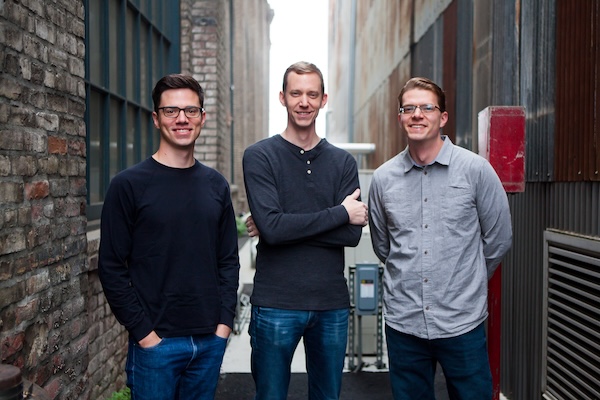Pico MES is a manufacturing tech company that’s transforming how small and mid-sized factories operate by replacing outdated paper-based systems with innovative digital tools. Pulse 2.0 interviewed Pico MES co-founder and CEO Ryan Kuhlenbeck to gain a deeper understanding of the company.
Ryan Kuhlenbeck’s Background

What is Ryan Kuhlenbeck’s background? Kuhlenbeck said:
“Growing up in a small factory town, I’ve always understood the vital role manufacturers play in their communities. This perspective shaped the mission of Pico MES: to help factories thrive while supporting the communities they serve. After graduating from Missouri University of Science & Technology, I settled in Bloomington, Illinois, a small factory town that embodies the backbone of American manufacturing. Living here keeps me close to the people and challenges Pico MES serves.”
“My career spans a wide range of manufacturing roles at General Motors, Tesla, and Alta Motors. There, I witnessed firsthand how the digital divide impacts factory workers’ day-to-day and how factories operate. Unlike typical Silicon Valley startups, Pico MES was built with an understanding of manufacturing from the ground up, not just from a high-level tech perspective. I’m not an outsider; I live and breathe manufacturing every day.”
Formation Of The Company

How did the idea for the company come together? Kuhlenbeck shared:
“The idea for Pico MES came directly from my firsthand experience on the factory floor and a desire to solve the inefficiencies I encountered throughout my career. While working at GM, Tesla, and Alta Motors, I saw how outdated processes held manufacturers back—especially small and midsize factories, which comprise 98% of the industry.”
“This lack of digitization not only limits their efficiency but also hampers their ability to meet national production and sustainability goals, support local economies, reduce manufacturing errors, and create a positive work experience amid an existential factory labor crisis.”
“After Alta Motors closed in 2018, I created the tools I wished I had as a manufacturing leader, solutions that could benefit factories of all sizes. In 2019, I co-founded Pico MES with Zac Nelson and Geoff Bucks to build an affordable, no-code manufacturing platform designed to digitize, error-proof, and streamline factory processes. By focusing on the direct needs of factory workers and leaders, Pico MES is helping bridge the digital divide in manufacturing and driving progress across the industry.”
Core Products
What are the company’s core products and features? Kuhlenbeck explained:
“Pico MES offers a manufacturing execution system (MES) platform for factories of all sizes. Its core products and features include:
- No-Code Digital Work Instructions: Easily create and deploy visual, step-by-step instructions that operators can follow without IT support.
- Error-Proofing Tools: Integrate quality checks and validations into workflows to prevent mistakes and ensure accuracy.
- Real-Time Data Collection: Digitize shop floor data with instant feedback and visibility into production processes.
- Device Integration: Connect seamlessly to over 2,500 devices, including sensors and tools, for end-to-end visibility.
- Shop Floor Visibility: Access dashboards and analytics to monitor performance, identify bottlenecks, and optimize processes.
- Scalable, Affordable Solutions: Deliver enterprise-level capabilities for factories of all sizes with easy implementation.
- Remote and On-Site Support: Manage processes flexibly with support for remote and on-site operations.”
Challenges Faced
What challenges have Kuhlenbeck and the team faced in building the company? Kuhlenbeck acknowledged:
“One of our biggest challenges has been breaking down the barriers to digitization that manufacturers face, such as high implementation costs, complex onboarding, and resistance to change. Many factories perceive digital transformation as too expensive, overly complicated, or simply out of reach, which creates hesitation to embrace modernization.”
“Pico has tackled this head-on by introducing a groundbreaking no-cost implementation model. We’ve eliminated daunting, upfront investment costs to allow manufacturers to explore our platform entirely risk-free and at their own pace. This approach not only makes digitization accessible but also de-mystifies the process, showing factories that modernization is achievable and impactful. By meeting manufacturers where they are and removing these barriers, we’re helping drive a long-overdue shift in the industry toward a more connected, efficient, and resilient future.”
Evolution Of The Company’s Technology
How has the company’s technology evolved since launching? Kuhlenbeck noted:
“Since launching, we’ve seen the manufacturing labor workforce shift dramatically, with the industry projected to face a shortage of 3.8 million jobs over the next decade. While accessibility, usability, and workforce engagement have always been our core drivers, we have expanded our focus to create a multi-generational digital experience to attract new factory workers, while retaining those who have been the backbone of the industry for generations.”
“We’ve designed an intuitive, accessible platform that bridges generational gaps. Digital work instructions simplify training, engage workers, and improve productivity. By replacing paper-based systems, our platform enables real-time tracking, error-proofing, and streamlined operations while offering no-cost entry to digitization.”
“These advancements make factory roles more appealing and empower manufacturers to modernize, attract talent, and strengthen their competitiveness in a rapidly changing industry.”
Significant Milestones
What have been some of the company’s most significant milestones? Kuhlenbeck cited:
“One of our most significant milestones so far has been surpassing 2,500 tool, device, and system integrations on our platform. Our software’s open API allows integration with other essential tools on the shop floor, streamlining factory digitization. By enabling plug-and-play connections with tools like torque controllers, barcode scanners, and IoT systems, we’ve removed the complexities of traditional software setups. This approach eliminates inefficiencies, enhances traceability, and improves quality across factory floors.”
Customer Success Stories
When asking Kuhlenbeck about customer success stories, he highlighted:
“We’ve seen numerous manufacturers replace outdated paper methods with our digital tech stack, often starting with installing digital work instructions. Given the cultural change required for their digital transition, each example is impressive in its own right. Whether it’s a small family-owned factory or an established automotive production facility with hundreds of operators, these deployments require a continuous improvement mindset and a digital champion at the helm.
- Winston Industries, a Louisville-based manufacturer well known for developing KFC’s original pressure fryer, transitioned its production floor off of paper to digital work instructions to enhance manufacturing productivity, streamline employee training, and improve retention for its multi-generational workers. With its digital assembly line, half of this manufacturer’s workforce consists of Gen Z and Millennials, well above the industry average and in contrast to the current manufacturing labor crisis.
- MORryde, an Indiana-based RV manufacturer, achieved a 50% increase in production output for one of its product lines by implementing digital work instructions and comprehensive error-proofing, a clear testament to the transformative potential of this technology.”
Funding
When asking Kuhlenbeck about the company’s funding details, he revealed:
“We have successfully raised a total of $21 million in funding, backed by a strong group of strategic investors. Our funding partners include Bosch Ventures, Schneider Electric Ventures, Congruent Ventures, Union Labs, Counterpart Ventures, and Momenta Ventures. This funding allows us to scale our operations, accelerate product development, and further our mission to revolutionize manufacturing operations through digital transformation.”
Total Addressable Market
What total addressable market (TAM) size is the company pursuing? Kuhlenbeck assessed:
“Our total addressable market (TAM) in the U.S. is between $1.5 billion to $2 billion annually. This reflects the growing demand for advanced manufacturing technologies that improve efficiency, reduce costs, and drive digital transformation. Pico MES is well-positioned to capture a significant share by offering solutions that optimize factory operations and enhance productivity.”
Differentiation From The Competition
What differentiates the company from its competition? Kuhlenbeck affirmed:
“Pico MES stands out with its democratized approach to factory digitization, offering a no-cost implementation program that provides manufacturers with the opportunity to experience our advanced solutions with zero upfront investment. This isn’t just a free trial—it’s an unlimited opportunity for manufacturers of all sizes to transform their operations and experience the full benefits of a connected supply chain. With an intuitive, cloud-based system that requires no credit card to get started, Pico MES eliminates the financial barrier to digital transformation, allowing manufacturers to optimize productivity and reduce training time with interactive digital work instructions.”
“At Pico MES, we’re committed to making modern manufacturing tools available to everyone, not just large enterprise OEMs. Our no-cost implementation allows factories to gain data-driven visibility and traceability over their production processes, empowering them to track every nut, bolt, and part. This enables factories to prevent, catch, correct, and eliminate errors at the source, significantly improving quality and efficiency.”
“Unlike competitors, with time-consuming and complex implementations, we make it easy and risk-free for manufacturers to digitize their operations confidently. At Pico MES, we’re not just providing software; we’re committed to reshaping and digitizing the manufacturing sector, creating a more resilient, connected American supply chain and supporting the factory workers essential to our economy.”
Future Company Goals
What are some of the company’s future goals? Kuhlenbeck emphasized:
“In the next five years, we aim to make factory modernization standard for manufacturers of all sizes. Digitization empowers factories to track every nut and bolt, improving error-proofing, efficiency, and supply chain transparency while meeting high-quality standards. It also enhances the work experience by simplifying training and processes, helping attract and retain employees amid a labor crisis.”
“Modernized factories not only reduce errors and improve operations but also revitalize local economies. By embracing these tools, small manufacturing towns can thrive, strengthening the heart of American industry in an era of reshoring and supply chain challenges.”
Additional Thoughts
Any other topics you would like to discuss? Kuhlenbeck concluded:
“One topic worth discussing is the impact of new traceability requirements, like the European Union’s Digital Product Passports (DPPs), on the global supply chain. As these digital records – which detail a product’s origins, materials, environmental impact, and disposal instructions – become mandatory in the EU by 2026, U.S. manufacturers have an opportunity to embrace the principles of digitally-driven transparency and quality to stay competitive. By doing so, they can enhance supply chain traceability, improve operational efficiency, and build customer trust – benefits that go beyond regulatory compliance. Early adoption can position U.S. manufacturers as leaders in a global market.”
“Factory digitization is also a prerequisite for manufacturing’s increasing appetite for artificial intelligence (AI). As more and more industries feel the pressure to onboard AI solutions in their work environments, the manufacturing sector can’t “put the cart before the horse” or rely on piecemeal solutions in an attempt to stay technologically relevant. A holistic, digital overhaul of factory operations will ensure the data behind AI algorithms is clean and relevant, setting the industry up for long-term success in a quickly evolving technology-driven market.”


